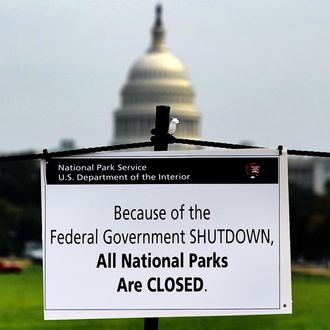
Usually when there’s an election cycle full of passionate intensity and near-universal perceptions of high stakes, the compensation for the teeth-grinding angst is a sense of resolution, with voters answering big questions and providing something of a policy mandate. Yes, 2000 was a muddle because the results themselves were hotly disputed (not that this kept the new Bush administration from behaving as though it had a mandate to cut taxes massively and look for excuses to topple Saddam Hussein to avenge that plot to kill Poppy). But usually we know more about the direction of the country after rather than before Election Day. And we could sure use some public guidance after six years of a Republican Congress making the total obstruction of a Democratic president its central, holy mission.
But the closer we get to November 8, the more that hope seems forlorn. Brian Beutler explains part of the problem:
Trump has completely upended the platonic notion of elections as tools to settle public policy debates. His agenda, such as it is, either can’t or won’t be implemented, even if he wins. Mexico is not going to pay for a wall along the border, and the U.S. government is not going to expel 11 million unauthorized immigrants, much less ban Muslims from entering the country. It is altogether more likely that were he to win, the movement conservatives who still control Congress would present him the kind of plutocrat-friendly legislation that alienated their voters and drove them to Trump in the first place. His supporters would be rewarded for their triumph with a vision of change they don’t share and didn’t vote for.
In the likelier event that Clinton wins, but does not secure majorities in both the House and Senate, the public will have rejected Trump’s ugly vision of a resentful, bigoted America, but will not see that verdict translated into any policy changes that reflect Clinton’s vision of a more inclusive, cosmopolitan society.
But it’s actually worse than that. If Trump loses, what Barack Obama used to call “the fever” of conservative extremism won’t “break,” for the simple reason that the keepers of the ideological flame loathe Trump as a heretic and won’t for a moment accept responsibility for anything about his campaign. The lesson many of them would “learn” from a Trump loss is the same they “learned” from McCain’s loss in 2008 and Romney’s in 2012: Only a rigidly orthodox conservative GOP can win national elections.
If, somehow, Hillary Clinton loses, it’s unclear Democrats will “learn” much of anything, either, other than the peril of going into a competitive election with a nominee who has high unfavorable ratings fed by decades of conservative attacks. There is no way a defeated Hillary Clinton runs again in 2020, and the most obvious alternative this time around, Bernie Sanders, will be pushing 80 by then. And there’s nothing about this campaign that suggests Democrats would be open to much cooperation with President Trump.
Now, should things go the opposite way with a solid or spectacular Clinton win and a Democratic conquest of both houses of Congress, there’s a chance things would open up. But as Barack Obama’s experience in 2009 demonstrated, it would almost certainly require not only a workable majority in the House but a majority in the Senate willing to undertake radical filibuster reform (at least for Supreme Court nominations, though possibly for regular legislation). And the window for accomplishing anything would be narrow: If Democrats hang on to the White House this year, 2018 would likely shape up as another GOP midterm landslide (especially in the Senate, where the landscape will be insanely pro-Republican then).
The kind of atmosphere we are more likely to see was, interestingly enough, described by Hillary Clinton herself in her recent interview with Ezra Klein:
“A lot of governing is the slow, hard boring of hard boards,” she says. “I don’t think there’s anything sexy, exciting, or headline-grabbing about it. I think it is getting up every day, building the relationships, finding whatever sliver of common ground you can occupy, never, ever giving up in continuing to reach out even to people who are sworn political partisan adversaries.”
No wonder so many Democratic primary voters thrilled to Bernie Sanders’s talk about a grassroots-driven “political revolution” that would make this “hard boring of hard boards” unnecessary. It would be nice if an election cycle or two could mobilize a previously hidden majority and sweep away all of the gridlock. Ideologues of both flavors (Ted Cruz along with Bernie Sanders) endlessly fantasize about this magic solution; the fact that it’s equally plausible for people in both parties is a pretty good sign it’s an illusion. So any way you slice it, 2017 is likely to feel familiar, and frustrating.






























